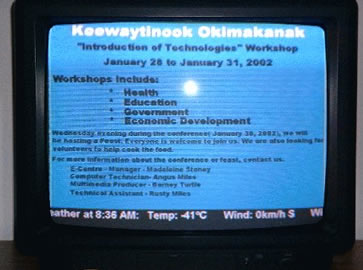|

TeleCommons Development Group
361 Southgate
Dr.,
Guelph, Ontario
N1G 3M5
519-822-8385
www.telecommons.com
Report on the Fort Severn Community
Engagement Workshop
January 28 -
February 1, 2002
| Background
|
 |
|
The TeleCommons Development Group
(TDG) is supporting K-Net in the implementation of the SMART project
by facilitating community engagement workshops and developing and
implementing a monitoring and evaluation methodology. This report
addresses both of these activities. The following summary describes
how these two components belong together. The monitoring and evaluation
methodology includes three levels of analysis:
|
|
Level
of analysis
|
Tools
to track changes
|
Remarks
|
|
Community
This level
will show how the community as a whole is using the technology;
comparisons among communities, and through time will be possible.
|
· Annual
survey of all households (August 2000, August 2001)
· Annual
survey of all organizations and businesses (August 2001)
|
The surveys use
standard indicators to track changes in the use of information and
communication technology (ICTs).
TDG and K-Net chose
the indicators.
|
|
Services
This level will
show how community services have improved. |
· Community
engagement workshops on Health, Education, Local Government and Economic
Development to learn about communities' dreams and expectations of
improved services
|
TDG and K-Net to
ask communities about what to measure to verify how services have
improved.
Feedback from both
providers and users of the services will be collected
(and organized into a result based management framework)
|
|
People
This level
will show how people's knowledge and skills using the technology
have improved.
|
· Needs
assessment tools on applications
· Self-assessment
tools on knowledge and skills
|
TDG will provide
the E-Centre managers with the tools, and will work with them to adapt
them as necessary |
The
central theme in this effort is to document how ICTs help communities
achieve their own goals.
Purpose
Les Meekis of K-Net Services and Galin
Kora of TDG traveled with to Poplar Hill and Fort Severn, between January
21 and February 1. Several other K-Net and KO representatives from the
health, education, and economic development sector joined the trips. The
purpose of the trips was:
1. To share information with the communities
on the progress with the SMART project (K-Net) and the monitoring and
evaluation effort (TDG).
2. To feedback the results of the
2000 and 2001 household and business surveys in each community, hear
reactions and comments, and gather ideas about further data to analyze.
3. To facilitate community engagement
workshops on Health, Education, Local Government and Economic Development
and learn about communities' dreams and expectations of improved services.
4. To ask communities about what to
measure to verify how services have improved.
5. To provide the E-Centre
managers with tools assess people's training needs and track how their
knowledge and skills improve using the technology.
Products
provided with this report.
· Summary
of the Fort Severn 2000 and 2001 household survey findings (Excel file,
PowerPoint presentation and Word commentary)
· Training
needs assessment tools (knowledge and skill assessment, needs assessment)
· File
with photos taken by TeleCommons during the workshops
First
Telecom Survey for Organizations and Businesses and Second Telecom Survey
for Houses
A
start up meeting was conducted on the evening of January 28 2002. The
objective of the meeting was to introduce the community members to the
agenda of the workshop, update them on the status of the SMART Project,
and share with them some of the findings from the house and business surveys
conducted during 2000 and 2001. To inform the community members about
the workshop, the E-centre staff had placed an ad with the local TV.

|
|
After each of the
participants introduced her/himself, Les Meekis informed the participants
about the suggested agenda for the following three days. Brian Beaton
(K-Net services) and Dan Pellerin (K-Net services) informed the participants
about the progress made with the SMART Project. |
| |
|
|
